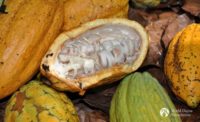Ferrero increases Fairtrade commitment
The company will double the amount of cocoa sourced from Fairtrade farmers over the next three years.

Ferrero has announced an increase in its Fairtrade commitment.
The company will double the amount of cocoa it purchases from Fairtrade farmers to 40,000 metric tons over the next three years. It will also begin a new collaboration with Fairtrade on cane sugar, and plans to source 20,000 metric tons between mid-2016 and 2019.
“The Fairtrade cocoa program is a key component of reaching our objective of 100 percent certified sustainable cocoa by 2020,” says Aldo Cristiano, who is responsible for Ferrero’s sustainability programs. “We also pursue the same objective for cane sugar, and our experience from the collaboration over the last few years shows that we have found a good partner in Fairtrade.”
Ferrero's collaboration with Fairtrade began in 2014, when it becan sourcing cocoa from Fairtrade cooperatives in Cote D’Ivoire.
“Ferrero’s long-term commitment means cocoa farmers in Cote D’Ivoire and sugar farmers in countries such as Costa Rica are going to benefit from secured sales and the additional Fairtrade Premium,” says Marina Vanin, global cocoa director, Fairtrade International. “Research has shown that Fairtrade farmers benefit the most when they can sell a significant percentage of their crops on Fairtrade terms.”
The Fairtrade Sourcing Programs enable cocoa, sugar and cotton farmers to do exactly that. They have the opportunity to sell their crops to a growing number of companies committed to sourcing key commodities fairly and sustainably.
Fairtrade also provides training and programs to farmers, tailored to local needs. The programs not only help improve farmers' productivity, but also provides cooperatives with training on gender equality and children's rights.
Farmers also receive a Fairtrade Premium, which they can then reinvest in organizational infrastructure, training, improvements in productivity, and good agricultural practices.
“With the agricultural training offered by the cooperative I was able to almost double my cocoa production. I am also working as a secretary in one of the cooperative’s sections," says Dembele Mamdou, member of the Ivorian cooperative Ecojad. "In the future we want to invest our premium in projects such as schools for our children and drinking water supply in the communities.”
Looking for a reprint of this article?
From high-res PDFs to custom plaques, order your copy today!







